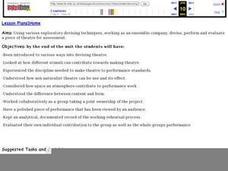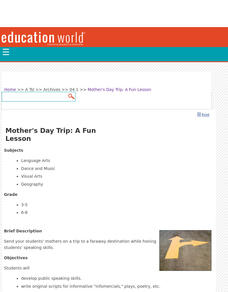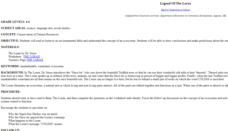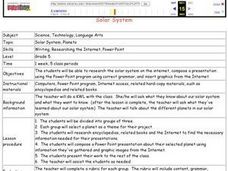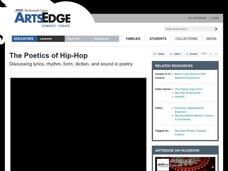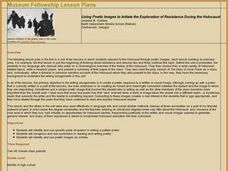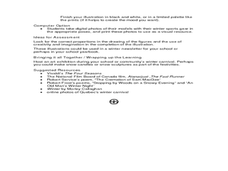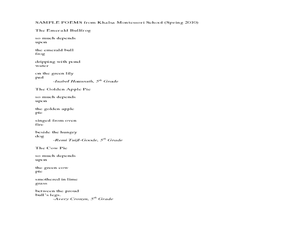Curated OER
Silly Story Starters
Fifth graders brainstorm some ideas for each of the columns. As they call them out, write some on the sticky notes until each sticky note is used for each column They stay in the same groups; have each group draw one sticky note from...
Curated OER
Theatre: Exploratory Techniques
Using various exploratory techniques, young actors work as an ensemble company to devise, perform and evaluate a piece of theatre for assessment. This outline provides an objective and a list of games and activities that stimulate skills...
Curated OER
Rewriting Shakespeare
Have your learners play around with Shakespeare's language. In this plan, small groups examine and rearrange soliloquies from Othello, noting how the language changes and morphs. All groups have a chance to change each soliloquy, making...
Curated OER
Julius Caesar: Fate Versus Free Will
Tenth graders engage in a study that is about Julius Caesar while reading a play. The role of the main character is examined while looking for motive and tension presented by Shakespeare. They write a summary and critique of the play.
Curated OER
Know Yourself
Eleventh graders explore the events of the Holocaust. In this cross curriculum lesson, 11th graders examine the differences between prejudice and discrimination. Students read various forms of literature and write...
Curated OER
Building Vocabulary Quadrant Charts
This clever language arts lesson invites pupils to read verses of poetry, then construct vocabulary quadrants on index cards. The cards are divided up into 4 sections: Word, Meaning, Opposite, Example. They choose a difficult word from...
Curated OER
Symbiosis: Help, Hinder or Destroy
Use background information and vocabulary to familiarize your students with the concept of symbiosis and the role agriculture plays in the shared relationship. They then write the vocabulary in their lab books or journals, and read the...
Curated OER
Mother's Day Trip
Help your class develop their public speaking skills. They write original scripts for informative infomercials, plays, or poetry. They work to present their information with purpose.
Curated OER
Legend of The Lorax
Students explore ecosystems. They read or listen to Dr. Seuss' The Lorax to draw conclusions and make predictions about the environmental impact and use of resources. They write poems about real forests and the wildlife which inhabit...
Curated OER
Language Arts: Bringing Verbs to Life
Kindergarteners create action words collections to use in their own writing projects. After listening to several books, they select action verbs to dramatize and take digital photographs of their acting. Once the photos are printed, they...
Curated OER
Kindergarteners Study the Four Seasons
Examine the weather of the four seasons, look at seasonal activities, and tell which months are part of each season with this lesson. Your class will play a game, sing a song, and write additional stanzas to seasonal poetry.
Curated OER
Interative History Notebook Mini-lesson
Students respond to Holocaust literature. In this interactive history instructional activity, students select quotes from chapter 1 of Elie Wiesel's Night and reflect on their meaning as they record their thoughts on poetic, prose,...
Curated OER
Writing Lyrics
Students examine the themes and structure of a bluegrass song and identify the common themes in bluegrass music. They practice songwriting by rewriting the lyrics of "Oh! Susanna" as a bluegrass tune.
Curated OER
A Look at Judith Leyster
Students consider the question, "How do I want people to see me?" as they examine the self-portrait of Judith Leyster. They develop and refine characterization of a subject through poetry writing
Curated OER
In Our Own Voice
Learners, after being introduced to poetry in the language arts class, prepare to produce a product by identifying and writing a variety of different types of poetry. They utilize digital cameras, camcorders, computers and the multimedia...
Curated OER
The Poetics of Hip Hop
High schoolers consider the role of rhythm, form, diction, and sound in poetry. In this integrated arts lesson, students discuss the attributes of poetry as they analyze Shakespearean sonnets, hip hop music lyrics, and poems by...
Curated OER
Using Poetic Images to Initiate the Exploration of Resistance During the Holocaust
Students explore the role of resistance during the Holocaust. Viewing images, they complete a set of notes on the Holocaust and discuss the feelings they get from looking at the photographs. They identify the parts of speech used in...
Curated OER
Under Joni Mitchell's Influence
Students view the AMERICAN MASTERS entitled Joni Mitchell: Woman of Heart and Mind, examine the concept of influence, and explore how Joni Mitchell and her work have influenced others. Students read, interpret, and analyze her lyrics by...
Curated OER
The White Stuff, Winter in Canada
Students write sound poems inspired by works of art they have viewed, create paintings with snow as subject, create zines about their perceptions of winter, and update one of Robert Harris' winter sports illustrations.
Four lessons on...
Curated OER
Meet One Picky Bird
Students complete a research project In this endangered species lesson, students use the "Think, Puzzle, Explore" method to learn about endangered species. Students research and write a report on the red-cockaded woodpecker.
Curated OER
Geo Jammin'-Day2, Lesson 7: Roll, Roll, Unroll the Scroll
Second graders write in journals, recording personal thoughts about what they learned and/or something they are wondering about.
Curated OER
The Red Wheelbarrow
Students explore an imagist poem. In this poetry lesson students write a poem in the imagist's style using "The Red Wheelbarrow" by William Carlos Williams as an example. The poems are read aloud and discussed.
Curated OER
Personality Poems
Young scholars create a bio-poem for themselves or characters in stories they have read. They explore common character traits.
Curated OER
Poetry for Kids
Sixth graders be immersed indirect experiences which are opportunities for students to reflect, look back, debrief or abstract from their experiences what they have felt, and thought, and studied.

